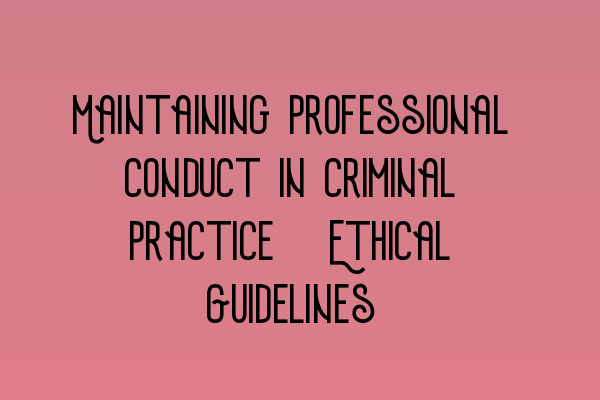Maintaining Professional Conduct in Criminal Practice: Ethical Guidelines
As a criminal lawyer, it is essential to uphold high ethical standards in order to maintain the trust of your clients and the integrity of the criminal justice system. In this blog post, we will discuss the importance of professional conduct in criminal practice and provide you with ethical guidelines to ensure your practice remains in line with the legal profession’s standards.
1. Duty to the Client
One of the fundamental principles of professional conduct is the duty you owe to your clients. It is crucial to always prioritize your client’s best interests and provide them with zealous representation. This means representing your clients to the best of your abilities, ensuring confidentiality, and maintaining open communication throughout the legal process.
Additionally, it is essential to manage your client’s expectations and provide them with realistic assessments of their case. Honesty and transparency are key in building a strong attorney-client relationship.
2. Integrity in Advocacy
As a criminal lawyer, your role is to advocate for your clients within the boundaries of the law. It is essential to always maintain the highest level of integrity in your advocacy. This means presenting accurate and truthful information to the court and avoiding any actions that could undermine the administration of justice.
When presenting arguments, it is important to rely on valid legal reasoning and evidence. Avoid using inflammatory language or tactics that could prejudice the court or the jury. Ensuring fairness in the legal process is paramount to upholding professional conduct in criminal practice.
3. Conflict of Interest
Managing conflicts of interest is crucial in maintaining professional conduct. It is your duty to avoid any situation where your personal interests or relationships could compromise your ability to effectively represent your clients.
If you become aware of a conflict of interest, you must act promptly and disclose the conflict to your clients. In some cases, you may need to withdraw from representing a client if the conflict cannot be adequately resolved.
4. Respect for the Rule of Law
Respecting the rule of law is fundamental to maintaining professional conduct in criminal practice. It means adhering to legal and ethical guidelines and upholding the integrity of the legal system. It also requires you to treat all individuals involved in the legal process with respect and dignity, including opposing counsel, judges, and court staff.
5. Continuing Professional Development
Staying up to date with legal developments and maintaining a strong knowledge base is vital for criminal lawyers. Engaging in continuing professional development (CPD) activities allows you to enhance your skills and ensure you are providing the best possible representation for your clients.
Consider enrolling in SQE 1 Practice Exam Questions and SQE 1 Practice Mocks FLK1 FLK2, which are excellent resources for preparing for the SQE 1 exam and reinforcing your knowledge in criminal law practice.
Conclusion
Professional conduct is the cornerstone of a successful career in criminal practice. By adhering to ethical guidelines and maintaining the highest level of integrity, you can build a reputation as a trusted and skilled criminal lawyer. Remember to always prioritize your clients’ interests, advocate with integrity, manage conflicts of interest, respect the rule of law, and engage in ongoing professional development.
For more information on SQE 2 Preparation Courses and SQE 1 Preparation Courses, visit our website. To stay updated with the latest SRA SQE Exam Dates, please click here.
